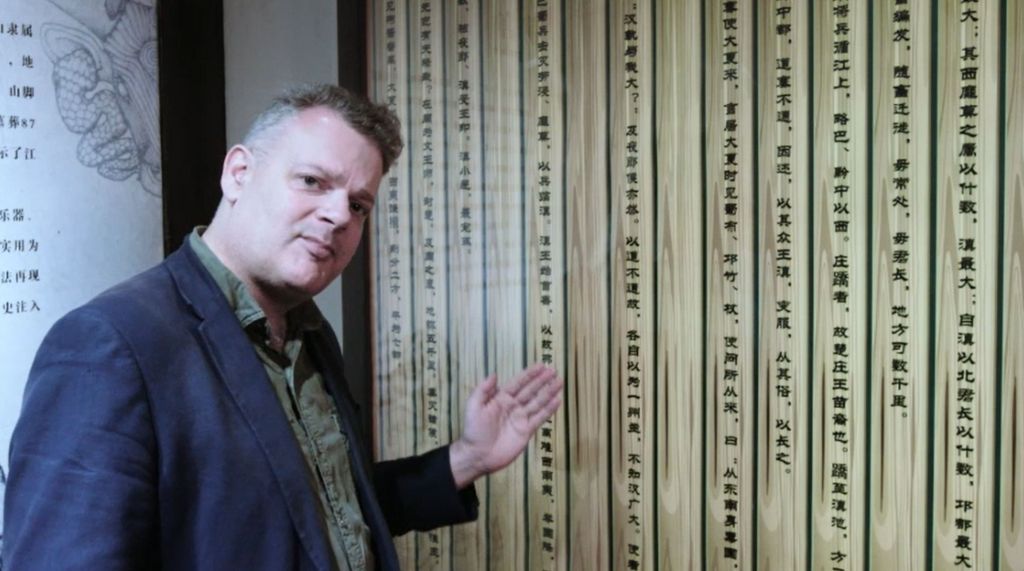
On the wall in the Yuxi Bronze Museum is a giant set of bamboo strips, engraved with classical Chinese. This is where I earn my money.
“Aha,” I say to the camera, “here we’ve got the entire text of the chapter of the Grand Scribe’s Records about the ‘south-western barbarians’. It starts with a geographical description of the region, the names of the tribes (see, here’s the Dian), and the lay of the land, and then it goes into the story of their first contact with the Chinese. Here we get the emissaries turning up from the Han Emperor, and a fantastic question from the Dian king, when he asks the ambassadors: ‘Is this Han realm bigger than mine?’ He really had no idea who he was dealing with, but when he finally submitted to the Han emperor, here it is, he is bestowed with a ‘royal seal’.”
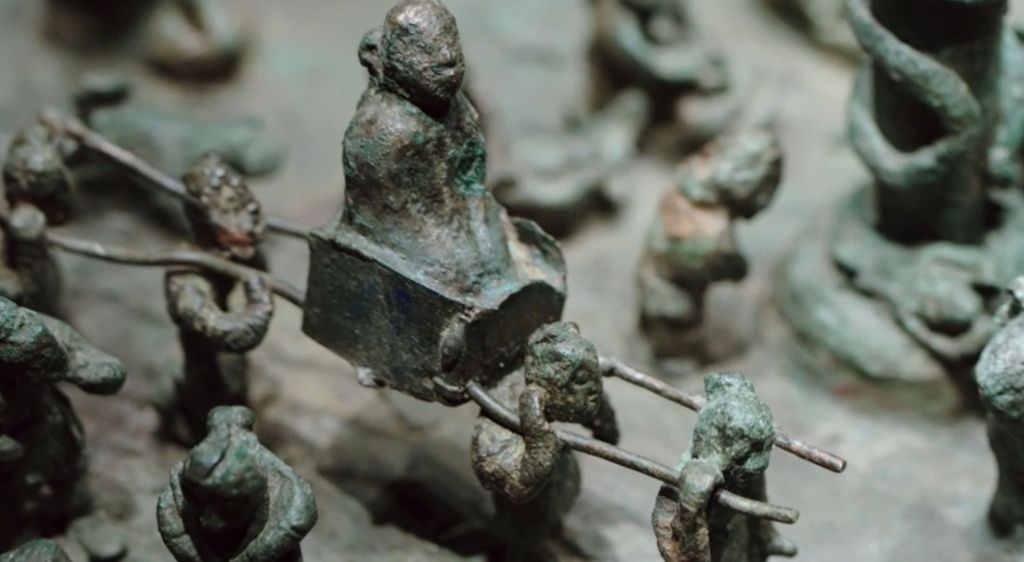
It’s a good morning in the bronze museum, where the staff stare open-mouthed in amazement as the foreign film crew completely ignores most of their exhibits, and concentrates on the stuff they consider boring – the bamboo strips carved with Chinese, and a naff-seeming diorama of life in Dian times. Except it’s not naff, I point out. Every single element of it has been drawn directly from the bronzes we have been examining. We have seen (and filmed) the original artefacts that informed the diorama’s hunting scene, its battle scene, and the scene of human sacrifice underway on a nearby hilltop.
Lunch is a fish hotpot cooked on hot stones, with Yunnan rice, which is like normal rice but comes with fried potatoes and bits of bacon. The director allows us fifteen minutes to descend like jackals on a nearby pottery shop, where I spend all the money I have earned this morning buying a new tea set, rice bowls and two cups decorated with the Heart Sutra. I think, between us, we manage to spend about £300, which makes the owner’s day, as she only opened ten minutes beforehand.
In the afternoon, we head out to a pokey village at the bottom of a mountain, where the locals inexplicably worship a mermaid goddess, whose pert baps seem to have been designed by a sculptor who has never seen a woman’s chest in real life. A cluster of pensioners, sunning themselves in the marketplace, soon drift over like zombies to see what the film crew is up to, but they are incredibly friendly, and our cameraman gets a lovely shot of me talking to three wizened old men about topless mermaids.
We are here to climb Lijiashan, the mountain where some eighty Dian kingdom graves were unearthed. It involves a wheezing ascent up endless steps, to a small guardhouse where we find Zhang Lineng, the watchman.
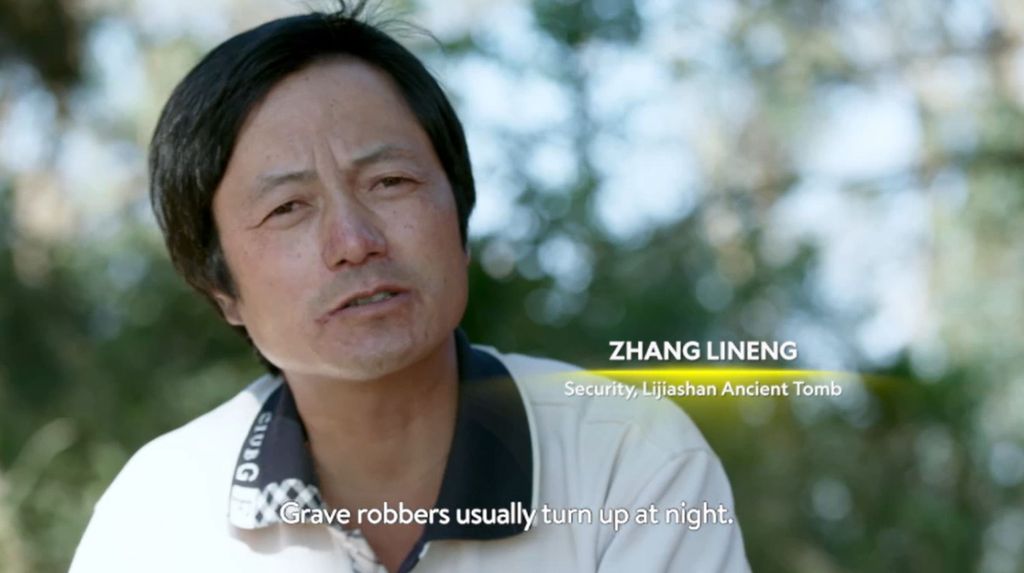
A huge part of my job, and something I am embracing with greater fervour as time goes by, lies in putting the interviewees at ease. Mr Zhang didn’t even know he was an interviewee before we showed up, and I am the first foreigner he has ever met. But I bound in and introduce myself, and get him chatting about his life.
Our fixer and Clicky the Propaganda Guy, who is still lurking around, protest that the man’s Chinese is unintelligible, and that we might need an interpreter. But he makes perfect sense to me, no more or less than anyone else. This has happened before, in Shandong, where Chinese people found locals difficult to understand, but I found them no harder to understand than anyone else. The local accent fiendishly replaces all H’s with F’s, and occasionally drifts towards Cantonese, but that’s it.
So he takes me around the pit where the Famous (not that famous) Cow Tiger Table was unearthed, and reminisces about how strange it was to the local villagers, like him, when their hilltop was suddenly deemed so important that the People’s Liberation Army sent an armed detachment to guard it.
Mr Zhang is a rare kind of interviewee, because he is a Michael Wood sort of choice – not an archaeologist or a historian, but a random man of the people who happens to work near the site. So while it’s not quite the usual National Geographic experience, it is oddly entertaining. He reminisces about how weird it was when he was a boy, and truckloads of archaeologists started turning up at the village at the bottom of the mountain, and how was there, literally standing at the side of Pit 69, when they unearthed a bronze cowrie shell container, decorated with dancing Central Asian shamans. He also reveals that the grave contained two bodies, a woman and a murdered slave girl, but that the coffin the archaeologists found was inexplicably thrown away.
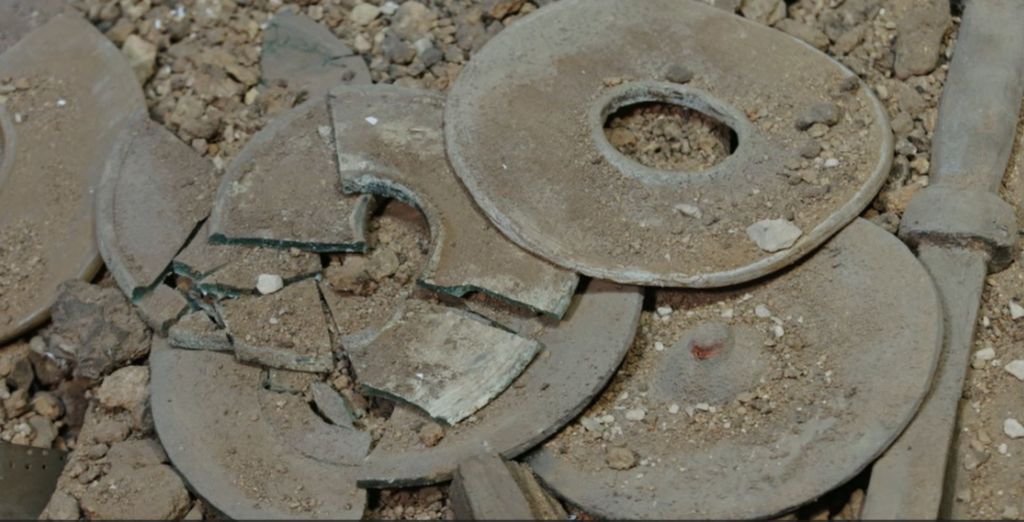
I ask him about life as a security guard.
“It was tough in the early days. The thing that’s made the biggest difference is the phone. If there are robbers on the site, I can call for back-up. I can call the police. Or someone who sees something suspicious can just call me. Life is a lot easier now.”
I ask if things get creepy up on the mountain alone at night.
“Well, down in the village people say that sometimes they can hear fighting. Swords clashing together and people screaming in a language they don’t understand. There was one night when I heard a real commotion outside, but when I came out to look, nobody was there.”
Clicky the Propaganda Guy is gesticulating wildly, calling a time-out on something he really doesn’t want discussed on camera. Second-hand local myths are one thing, but a self-reported experience of the supernatural will not be allowed on television in China.
At which point, the director slaps me in the face.
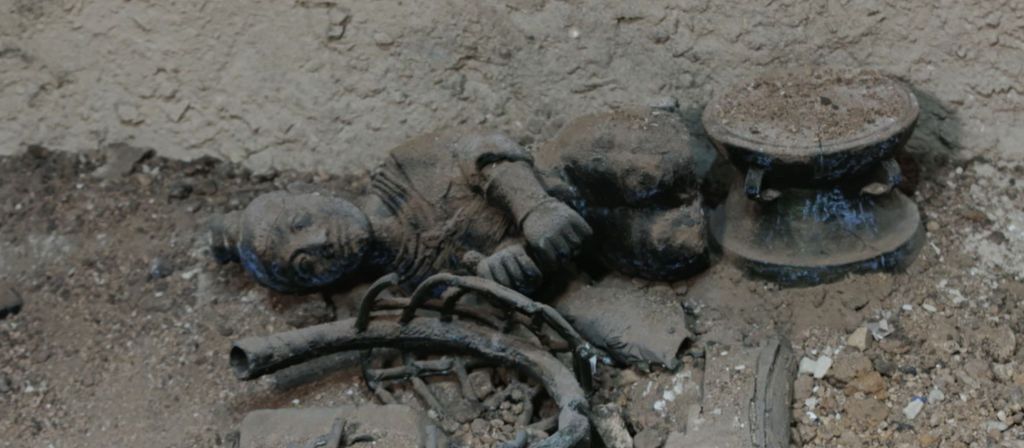
She had seen a mosquito on my cheek, and took extreme action in a split-second, lest it suck my blood and leave a lump on my face sure to ruin the next week’s filming. Her palm lands with an impressively loud whack, and oblivious to the reason why, all Mr Zhang sees is a small Chinese woman beating up the presenter.
“Wow,” he says. “You have a tough job.”
Our pocket drone struggles like the Little Engine That Could against the high winds on the mountain top. There is just time to rush back to the Bronze Museum, which now has the sun on its façade, to shoot the opening shot of me entering. Except the museum has closed five minutes early and the staff have scarpered, so we have to cheat by placing the camera on the other side of the street, and having me walk across the road as if it is the path leading up to the door. But we have to wait first for a marching column of soldiers to pass by. They stare at me warily, until I give the Communist Party salute, at which point they all start giggling and saluting back.
Jonathan Clements is the author of A Brief History of China. These events featured in Route Awakening S05E05 (2019).
